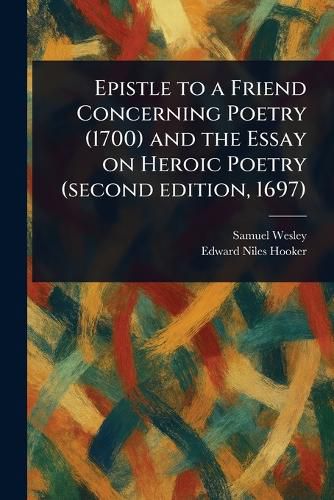Readings Newsletter
Become a Readings Member to make your shopping experience even easier.
Sign in or sign up for free!
You’re not far away from qualifying for FREE standard shipping within Australia
You’ve qualified for FREE standard shipping within Australia
The cart is loading…






This title is printed to order. This book may have been self-published. If so, we cannot guarantee the quality of the content. In the main most books will have gone through the editing process however some may not. We therefore suggest that you be aware of this before ordering this book. If in doubt check either the author or publisher’s details as we are unable to accept any returns unless they are faulty. Please contact us if you have any questions.
Explore the world of 18th-century literary thought with Samuel Wesley's "Epistle to a Friend Concerning Poetry, 1700 and the Essay on Heroic Poetry 1697." This volume presents two key works exploring the art and theory of epic poetry. Wesley delves into the heroic form, offering insights valuable to both students and enthusiasts of poetry.
A significant voice in literary criticism, Wesley provides a window into the poetic sensibilities of his time. This collection offers a fascinating perspective on the construction and appreciation of epic poems. His "Essay on Heroic Poetry" engages with the principles of epic composition. "Epistle to a Friend Concerning Poetry, 1700" provides a more personal reflection on poetic craft.
This edition is a meticulously prepared republication of these essential texts, allowing readers to engage directly with Wesley's original arguments and observations on epic poetry.
This work has been selected by scholars as being culturally important, and is part of the knowledge base of civilization as we know it.
This work is in the public domain in the United States of America, and possibly other nations. Within the United States, you may freely copy and distribute this work, as no entity (individual or corporate) has a copyright on the body of the work.
Scholars believe, and we concur, that this work is important enough to be preserved, reproduced, and made generally available to the public. We appreciate your support of the preservation process, and thank you for being an important part of keeping this knowledge alive and relevant.
$9.00 standard shipping within Australia
FREE standard shipping within Australia for orders over $100.00
Express & International shipping calculated at checkout
This title is printed to order. This book may have been self-published. If so, we cannot guarantee the quality of the content. In the main most books will have gone through the editing process however some may not. We therefore suggest that you be aware of this before ordering this book. If in doubt check either the author or publisher’s details as we are unable to accept any returns unless they are faulty. Please contact us if you have any questions.
Explore the world of 18th-century literary thought with Samuel Wesley's "Epistle to a Friend Concerning Poetry, 1700 and the Essay on Heroic Poetry 1697." This volume presents two key works exploring the art and theory of epic poetry. Wesley delves into the heroic form, offering insights valuable to both students and enthusiasts of poetry.
A significant voice in literary criticism, Wesley provides a window into the poetic sensibilities of his time. This collection offers a fascinating perspective on the construction and appreciation of epic poems. His "Essay on Heroic Poetry" engages with the principles of epic composition. "Epistle to a Friend Concerning Poetry, 1700" provides a more personal reflection on poetic craft.
This edition is a meticulously prepared republication of these essential texts, allowing readers to engage directly with Wesley's original arguments and observations on epic poetry.
This work has been selected by scholars as being culturally important, and is part of the knowledge base of civilization as we know it.
This work is in the public domain in the United States of America, and possibly other nations. Within the United States, you may freely copy and distribute this work, as no entity (individual or corporate) has a copyright on the body of the work.
Scholars believe, and we concur, that this work is important enough to be preserved, reproduced, and made generally available to the public. We appreciate your support of the preservation process, and thank you for being an important part of keeping this knowledge alive and relevant.